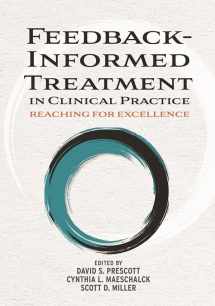
Feedback-Informed Treatment in Clinical Practice: Reaching for Excellence
Book details
Summary
Description
Through feedback-informed treatment (FIT), clinicians gather real-time input from clients through structured yet flexible measures that identify what is and is not working in therapy and how to better meet clients’ needs. This book coalesces expert insights from practitioners who have successfully integrated FIT in their own work. Their experiences demonstrate how other clinicians can incorporate FIT into their own practices to consistently monitor clients’ progress and the therapeutic alliance.
The book first reviews FIT theory, specific measures (including the Outcome Rating Scale and the Session Rating Scale), and general strategies for implementing FIT in practice and supervision. This information is then translated into more specific applications of FIT with different kinds of clients, including individuals, couples, children and families, LGBTQ clients, and clients suffering from addiction and early onset psychotic disorders. A variety of treatment settings are also represented, such as private practice, clinics, group therapy, the criminal justice system, and pharmacies. The concluding chapter ties together the book’s overarching themes with friendly, practical advice about using FIT to bolster professional development and improve one’s clinical abilities.


We would LOVE it if you could help us and other readers by reviewing the book
Book review



